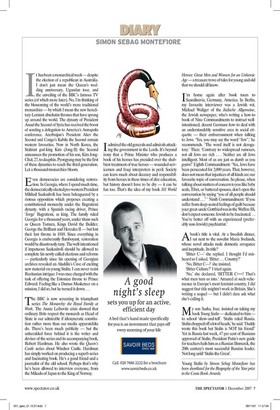Diary
SIMON SEBAG MONTEFIORE 1 t has been a monarchical week — despite the election of a republican in Australia. I don't just mean the Queen's wedding anniversary, Ugandan tour, and the unveiling of the BBC's famous TV series (of which more later). No, I'm thinking of the blossoming of the world's more traditional monarchies — by which I mean the new hereditary-Leninist absolutist thrones that have sprung up around the world. The dynasty of President Assad the Second of Syria has received the boost of sending a delegation to America's Annapolis conference. Azethaijan's President Aliev the Second and Congo's Kabila the Second remain western favourites. Now in North Korea, the Stalinist god-king Kim (Jong-I1) the Second announces the promotion of his son, Kim JongChul, 27, to dauphin. Pyongyang may be the first of these dynasties to reach the third generation. Let a thousand monarchies bloom.
yen democracies are considering restoration. In Georgia, where I spend much time, the democratically elected pro-western President Mikhail Saakashvili has been beleaguered by a riotous opposition which proposes creating a constitutional monarchy under the Bagrationi dynasty, with a Spanish racing driver, Prince 'Jorge' Bagrationi, as king. The family ruled Georgia for a thousand years, under titans such as Queen Tamara, Kings David the Builder, George the Brilliant and Hercules II — but lost their last throne in 1810. Since everything in Georgia is exuberantly flamboyant, restoration would be disastrously zany. The well-intentioned if impetuous Saakashvili should be allowed to complete his newly called elections and reforms — particularly since his opening of Georgian archives revealed an Aladdin's Cave of exciting new material on young Stalin. I can never resist Ruritanian intrigue: I was once charged with the task of offering the Estonian throne to Prince Edward. Feeling like a Dumas Musketeer on a mission, I did so, but he turned it down. . .
The BBC is now screening its triumphant series The Monarchy: the Royal Family at Work. The Annie Leibovitz crisis showed that ordinary Brits respect the monarch as Head of State in our admirable if idiosyncratic constitution rather more than our media apparatchiks do. There's been much publicity — but the unheralded force behind it is the writer and deviser of the series and its accompanying book, Robert Hardman. He also wrote the Queen's Castle series about Windsor Castle. Hardman has simply worked on producing a superb series and fascinating book. He's a good friend and a journalist of the old school. Perhaps that's why he's been allowed to interview everyone, from the Mikado of Japan to the King of Norway.
T admired the old generals and admirals attacking the government in the Lords. It's beyond irony that a Prime Minister who produces a book of his heroes has presided over the shabbiest treatment of true heroes — wounded servicemen and Iraqi interpreters in peril. Society can learn much about decency and responsibility from heroes in these times of dire education, but history doesn't have to be dry — it can be fun too. That's the idea of my book 101 World Heroes: Great Men and Women for an Unheroic Age — a treasure trove of tales for young and old that we should all know.
I'm home again after book tours to Scandinavia, Germany, America. In Berlin, my favourite interviewer was a Jewish wit, Michael Wuliger of the Jadische Allgemeine, the Jewish newspaper, who's writing a how-to book of Nine Commandments to instruct wellintentioned, decent Germans how to deal with an understandably sensitive area in social etiquette — their embarrassment when talking to Jews. 'Yes, you may say the word "Jew",' he recommends. The word itself is not derogatory.' Then: 'Contrary to widespread rumours, not all Jews are rich . . . Neither are all Jews intelligent. Most of us are just as dumb as you goyim!' Eighth Commandment: 'Yes, Jews have been persecuted for 2,000 years. That, however, does not mean that injustices of all kinds are our favourite topic of conversation. So please, when talking about matters of concern to you like baby seals, Tibet, or battered spouses, don't open the conversation by saying "you of all people should understand. .." ' Ninth Commandment: 'If you suffer from deep-seated feelings of guilt because your great-uncle Gottfried was in the Waffen-SS, don't expect someone Jewish to be fascinated. . . You're better off with an experienced (preferably non-Jewish) psychiatrist' Abook's title is vital. At a Swedish dinner, I sat next to the novelist Maria Svelands, whose novel attacks male domestic arrogance and ineptitude. Its title?
'Bitter C—' she replied. I thought I'd misheard so I asked, 'Bitter. ... Country?'
'No, Bitter C—!' she insisted.
'Bitter Culture?' I tried again.
'No,' she declared, `BI ITER C***! That's what men turn us into 'Amazed at such vehemence in Europe's most feminist country, I did suggest that title mightn't work in Britain. She's writing a sequel — but I didn't dare ask what she's calling it.
My son Sasha, four, insisted on taking my book Young Stalin — dedicated to him — to school `show-and-tell'. 'Stalin ruled Russia. Stalin chopped off a lot of heads,' he said. 'Daddy wrote this book but Stalin is NOT his friend!' Yet in Russia last week, 47 per cent of Russians approved of Stalin. President Putin's new guide for teachers hails him as a Russian Bismarck, the 20th century's most successful Russian leader. Not long until 'Stalin the Great'.
Young Stalin by Simon Sebag Montefiore has been shofilisted for the Biography of the Year prize in the Costa Book Awards.





































































 Previous page
Previous page